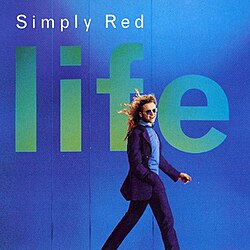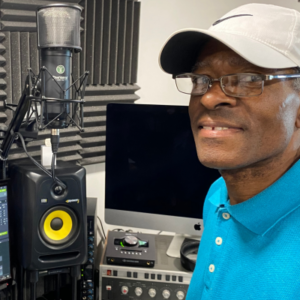While Mick Hucknall took on the lion’s share of songwriting by this stage, McIntyre’s role remained evident in the arrangements and the vocal textures that defined the album. His presence as a backing vocalist enriched choruses across the record, and his ability to weave gospel warmth into Hucknall’s lead ensured that the band retained its soulful identity even as production trends leaned increasingly towards mainstream Pop.

“Life”
By the mid-1990s, Simply Red had become a household name, enjoying both commercial dominance and critical recognition. Their fifth studio album, “Life” (1995), continued this trajectory, producing the international hit “Fairground” and further cementing the band’s place within the canon of British Soul-Pop. Yet for Fritz McIntyre, the group’s founding keyboardist and one of its most important creative voices, “Life” marked both a continuation of his artistry and the conclusion of his tenure with Simply Red. His departure following the album signalled the end of an era and highlighted just how integral his contribution had been since the band’s inception.
On “Life”, McIntyre adapted his playing to the mid-1990s soundscape, employing richer synthesisers and layered keyboard arrangements. The lead single, “Fairground”, driven by its innovative use of a sample from The Goodmen’s “Give It Up”, may have been rhythmically distinctive, but it was McIntyre’s chordal foundations that gave the track its harmonic body. On more reflective songs such as “Remembering the First Time” and “So Beautiful”, his playing added emotional resonance, anchoring Hucknall’s voice within a bed of warmth and colour. As always, McIntyre’s hallmark restraint was in evidence: never ostentatious, but consistently shaping the mood of the record.
By “Life”, Simply Red had matured into a seasoned international act, yet the sense of ensemble that had characterised their earlier records was still strongly present. McIntyre’s vocal harmonies and keyboard textures were vital to maintaining this cohesion. His contributions ensured that even as Hucknall increasingly assumed the role of band leader, the sound remained collective rather than singular, reflective of Simply Red’s origins as a group rather than a solo project.
Produced once again by Stewart Levine, “Life” bore the hallmarks of a commercially polished mid-1990s release. Amid the glossy production, McIntyre’s work provided continuity with Simply Red’s earlier sound, preserving the soul-infused warmth that had distinguished the band from its peers. Levine’s production choices gave space to McIntyre’s keyboards, ensuring they remained central in shaping the band’s atmosphere.
Following the release of “Life” and the subsequent world tour, Fritz McIntyre stepped away from Simply Red. His departure marked a decisive shift: while Mick Hucknall carried the project forward with new line-ups, the loss of McIntyre — a founding member, songwriter, and the band’s harmonic architect on keyboards — effectively brought an end to their original creative synergy. For Simply Red’s first decade, McIntyre had been a central voice, shaping the harmonic palette, vocal blend, and tonal atmosphere across albums from “Picture Book” to “Life.” His absence removed a vital layer of counterpoint and colour that had balanced Hucknall’s lead, altering the group’s texture and collective identity in the years that followed.

















